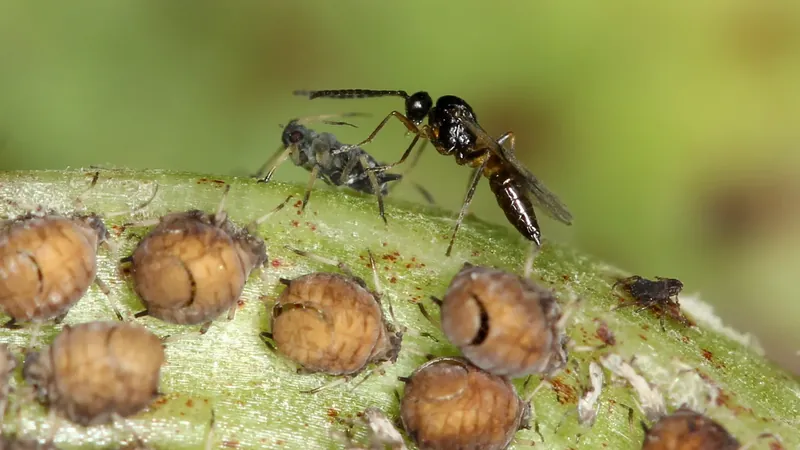
Unveiling Nature's Secrets: Tiny Wasp's Unique Reproductive Strategy Could Revolutionize Agriculture
2025-06-16
Author: Ming
A Surprising Discovery in Reproduction
In a groundbreaking study, Dr. Rebecca Boulton from the University of Stirling has revealed that the tiny wasp known as Lysiphlebus fabarum can reproduce both sexually and asexually. This revelation shakes the foundation of prior beliefs that asexual females could not mate with males to produce offspring.
Nature's Own Pest Control Agents
This remarkable wasp species, notorious for laying its eggs inside sap-sucking aphids, serves as a natural pest controller by consuming its host from the inside out. While both sexual and asexual populations exist, the ability of asexual females to mate with males opens new doors for enhancing biological pest control.
A Game Changer for Biological Pest Control
Parasitoid wasps, like Lysiphlebus fabarum, are mass-bred as eco-friendly alternatives to chemical pesticides. They target pests by laying eggs inside them, ensuring the wasp larvae develop at the expense of the host. With asexual reproduction allowing rapid population growth, understanding these wasps' mating strategies could lead to more robust biocontrol agents that adapt better to local ecosystems.
The Evolutionary Edge of Sexual Reproduction
Dr. Boulton emphasized the evolutionary significance of sexual reproduction. While asexual reproduction is efficient, it limits genetic mixing, potentially jeopardizing the species' adaptability in changing environments. The study hints at the hidden costs of facultative sex, as it appears to diminish reproductive success for female wasps, potentially limiting how frequently this behavior occurs in nature.
Navigating the Experiment
Initially, Dr. Boulton planned to observe competition between asexual and sexual wasps for parasitizing aphids. However, she soon noticed a surprising trend: asexual females began mating with males. This pivotal moment inspired her to delve deeper into this mating behavior, ultimately leading to paternity testing that confirmed the asexual females were indeed fertilizing their eggs.
Promising Implications for Agriculture
By investigating the mating dynamics, Dr. Boulton's research could pave the way for developing new biocontrol agents that are specifically tailored to tackle aphids globally. Her study emphasizes the potential of harnessing natural reproductive behaviors to tailor pest control solutions to different environments.
Publishing Groundbreaking Findings
Dr. Boulton's findings, featured in the Royal Society of Open Science, highlight the importance of curiosity-driven research. Funded through a BBSRC Discovery Fellowship, this innovative study not only strengthens the UK’s bioscience landscape but also promotes sustainable agricultural practices.
The Future of Pest Management Looks Bright
As the agricultural industry seeks greener pest control alternatives, the insights gained from this tiny wasp's reproductive versatility may lead to a profound transformation in how we manage crop pests, ultimately benefiting the environment and food security.




 Brasil (PT)
Brasil (PT)
 Canada (EN)
Canada (EN)
 Chile (ES)
Chile (ES)
 Česko (CS)
Česko (CS)
 대한민국 (KO)
대한민국 (KO)
 España (ES)
España (ES)
 France (FR)
France (FR)
 Hong Kong (EN)
Hong Kong (EN)
 Italia (IT)
Italia (IT)
 日本 (JA)
日本 (JA)
 Magyarország (HU)
Magyarország (HU)
 Norge (NO)
Norge (NO)
 Polska (PL)
Polska (PL)
 Schweiz (DE)
Schweiz (DE)
 Singapore (EN)
Singapore (EN)
 Sverige (SV)
Sverige (SV)
 Suomi (FI)
Suomi (FI)
 Türkiye (TR)
Türkiye (TR)
 الإمارات العربية المتحدة (AR)
الإمارات العربية المتحدة (AR)